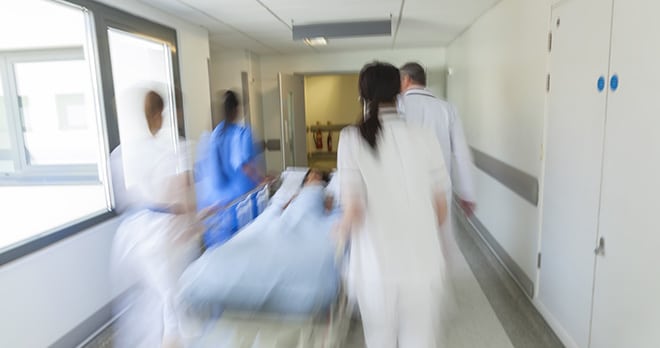Should we be surprised by the staffing crisis in the NHS?

‘Nine in 10 NHS bosses say that staffing crisis is endangering patients’ has made headlines across the media this week. It seems every other day brings reports of the NHS not meeting targets or patients meeting with persistent delays.
Unfortunately we have been hearing that the NHS is understaffed for years and it is something which many now sadly recognise as a new normal. Whilst I’m not going to apportion blame to any political party, should we really be surprised after years of under-funding?
What is happening now and how we got here
There are many things going on that have created this chronic understaffing in the NHS: the removals of the grants for student nurses, the poor pay for junior doctors, short retention rates, an aging population, lack of investment, perhaps even Brexit; the list goes on.
One of the things the NHS has always been able to rely on is doctors and nurses doing extra shifts and longer hours to ensure that people are not harmed and surgeries are not cancelled unless absolutely necessary. However, former Chancellor George Osborne introduced new tax rates in relation to pensions in 2016/2017 which have significantly affected the number of senior consultants picking up the slack.
I will not bore you with the details of how the introduced tax worked, but effectively it means that some doctors are being charged effective tax rates of over 100% on extra hours - i.e. they are working for free or paying for the privilege.
Understandably, the community was outraged when they heard of much needed senior consultants being slapped with tax bills that were forcing them to sell their homes and/or lose their life savings. What did most senior consultants do? What most of us would have done, stop taking extra shifts and retire early (if they were near retirement). This of course caused even more pressure and overall created a low morale both within the NHS and the general public as a whole. More and more elective surgeries are now being cancelled or severely delayed which in itself is causing even more pressure on the NHS.
The situation has become so stark that the Government has announced that the NHS will be fronting the bills for the doctors, up to £100K, in order to stop the exodus and incentivise them to take more shifts again. However, the serious understaffing and underfunding has reached an unprecedented level and needs a lot of investment and ‘making up’.
What the stats tell us
Don’t just take my words at face value, look at the figures:
The NHS’s budget was increased by 6.3% in 2009/2010 but the percentage increased has been dwindling in the last 10 years. This has culminated in a percentage increase of 1.1% of budget for 2019/2020, the lowest since the inception of the NHS.
In June 2019, the Guardian reported:
“Nearly 20% of consultants have cut the number of hours they work and 42% have reduced the amount of extra shifts they do, faced with the threat of receiving bills that can top £50,000 in a year, according to the research commissioned by NHS Employers.” And “As many as one in four senior doctors may quit the service altogether, according to the survey of 2,500 consultants in England earning more than £60,000 a year. Some doctors have been forced to remortgage their homes to pay hefty tax bills arising from their pension contributions while others are doing more work in the private sector because earnings there do not affect their NHS pensions.”
“the proportion of patients waiting less than two months to start cancer treatment following an urgent GP referral has decreased significantly over time. In Q1 2010/11, 87.5% of patients started treatment within 62 days, compared to 77.8% in Q1 2019/2020.”
In November the Guardian reported:
“NHS figures obtained by the Guardian show that it (the NHS) paid for 214,967 people in England to have an operation in a private hospital in 2009-10, Labour’s last year in power. The figure soared to 613,833 last year, a 185% rise in nine years.
The figures come as NHS trusts are increasingly forced to send patients to for private surgery because they are too busy and understaffed to do the operations themselves.”
The Nuffield Trust has also reported a decrease in the number of GPs per person in England of 1.4% and of 2.2% in Wales between 2016 and 2018. Whilst this may seem a small decrease it is having very significant impact in people’s ability to get an appointment.
In September 2019 NHS England reported that 4,416,883 people were waiting to start treatment.
Finally, in July 2019, the Independent reported:
“As experts warned the health service was “struggling to cope”, performance statistics revealed 275,526 patients were seen after the targeted time last month compared with 208,083 in July 2018, an increase of almost a third (32.4 per cent).
From decision to admit to admission, 57,694 were seen after four hours – a rise of 34.7 per cent from the same month last year.
This is also the highest number for July since current records began in August 2010.
Of these, 436 patients waited more than 12 hours – 192.6 per cent higher than July 2018.”
The reality of these statistics is that the number of people injured or left in pain due to a delay in diagnosis and treatment is on the rise, and the full effects have not yet reached us. Opportunities for early treatment are being routinely missed requiring more involved treatment, lengthier hospitals stays and resulting in poorer outcomes, which in turn is putting even more pressure on the NHS. Neglect on the wards leading to avoidable harm is also on the rise, especially amongst the most vulnerable in society, the elderly and those severely disabled. And, brace yourselves, winter is coming and it is going to be a cold one.